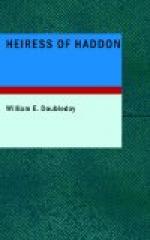“I was hindered,” returned Sir Everard, highly nettled at the other’s tone and speech. “My horse fell lame with a stone in his shoe, and I had to return.”
“At Cromford he set a pack of knaves upon me,” pursued De la Zouch, with the coolest audacity. “I was almost murdered; I tried to save her, but what could I do? They were ten to one, and whilst I fought like a madman, Dorothy and Manners laughed at me to my face and rode off together.”
“You lie,” returned Crowleigh, hotly.
“Do I?” he replied with a sneer, “then prithee what does this bespeak, and this, and this?” and he showed in turn the scratches and bruises on the various parts of his body.
“At Cromford?” inquired the baron. “Did you say at Cromford?”
“Aye, at Cromford, Sir George. I struggled hard to rescue Dorothy for thee, but it was of no avail. No man can combat ten and win.”
“I passed Cromford myself and saw naught of it, nor yet had any of the villagers,” said the baron severely.
“And what means this?” continued De la Zouch, pointing to the battered hat and soiled and torn clothes. “Do not these alone prove that I am speaking but the truth? Can you doubt me longer now?” and he glanced round indignantly, and acted his part so well that he almost persuaded himself that he was a much-abused and persecuted person.
“Did no one witness the struggle, Sir Henry?” asked the sceptical Stanley. “Was there not one during all that time passed by?”
“In faith, Sir Thomas, I know not,” he replied. “I found no time to look. I had work enough to do to save my skin, I assure you. He has taken her to London.”
“The ingrate!” warmly exclaimed Lady Maude, who had just entered the room. “And Dorothy is worse than he. Let them go, Sir George, they are not worth the finding; let them go.”
“Well, ’twas a knightly thing to do, to leave a lady; a right gallant thing, nay by my troth it was,” said Stanley, severely. “And my brother is on his way here, too; what will Edward say?”
“Poor Sir Henry, we have judged thee hardly, I fear, but we must try to make amends for it now,” said the dame sympathetically.
“She must be found; she shall,” interrupted the baron, emphasising the last word with a stamp of the foot. “Manners shall suffer though I—”
“Tush, Sir George, let them go,” interrupted his good lady. “They will want to return soon enough.”
“Nay, she must be traced and brought home again,” said Stanley. “Edward would die of chagrin else.”
“She shall be found,” repeated the baron decisively.
De la Zouch had mentally calculated that a slight relapse in his condition would probably arouse a wider feeling of sympathy for him, and to secure this end he closed his eyes and gasped for breath, but the feeling of suspicion was too firmly rooted to be dispelled so easily, and he opened his eyes again to find his companions as cold and unsympathetic as before.




